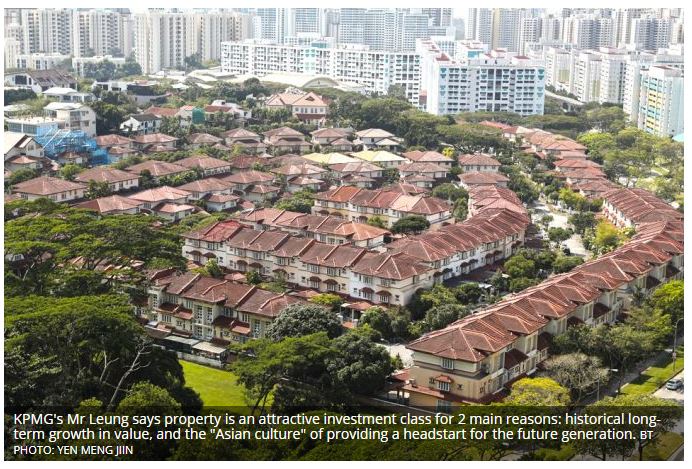Singapore real estate will endure as popular asset class
SINGAPORE property is likely to retain its lustre as a preferred choice for long-term wealth creation due to the city-state’s regional hub status, solid growth prospects and Asians’ deep-seated desire to own property.
Analysts gave this affirmation as the dust starts to settle on the latest cooling measures which took effect on July 6. The amended rules saw higher Additional Buyer’s Stamp Duty (ABSD) and lowering Loan-to-Value (LTV) limits in a pre-emptive strike to prevent prices running “ahead of economic fundamentals” and “the risk of a destabilising correction later”.
KPMG Singapore principal consultant for tax Leung Yew Kwong said: “For the locals, they find Singapore property attractive as they have seen the value of their property appreciate over the long term.”
Singaporeans’ relationship with residential property is also inextricably intertwined with the national narrative, when home ownership was encouraged for citizens to have a stake in the country.
In the view of Hou Wey Fook, chief investment officer of DBS Bank, demand will be underpinned by one key factor: demographics.
According to forecasts by DBS Research, should the population grow to 6.5 million in 2030, annual demand will range from 12,000 to 13,500 units – the majority coming from HDB upgraders.
Mr Hou also noted the role played by foreign buyers. He believes there will always be investors scouting for property bargains in the region, given the ongoing search for yield. “And on a relative basis, we believe that Singapore properties remain affordable compared to other countries.”
Mr Leung added that many foreigners see property here as a “natural currency hedge” as their home countries are often beset with depreciating currencies and volatile political situations.
In Asia, many investors also view real estate as an “inflation-proof store of value” to be passed on to their children to give them a headstart in their future housing needs, he said. And Singapore has no estate duty or inheritance tax to boot.
Alice Tan, director of Residential Project Marketing, Knight Frank, said that on average in 2017, foreigners accounted for about 25 per cent of total private home transactions.
She said: “The country’s enduring strengths of clear legal and institutional systems, progressive development plans, relative liquidity of the resale market, and clarity of real estate market data promote the appeal to own Singapore residential property.”
KPMG’s Mr Leung explained that property remains an attractive investment class for two main reasons: historical long-term growth in value, and the “Asian culture” of providing a headstart for the future generation.
As the economy grew, residential property – which is a significant store of Singaporeans’ wealth – also gained in value. This allowed Singapore home owners to share in the country’s wealth creation.
This pursuit of The Singapore Dream has become so ingrained in the psyche that it has reached new extremes – some do not own just one, but several properties for investment or speculation.
Mr Leung concurred that this “deep-seated desire among locals to upgrade” has continued to fuel demand for private residential property.
Hartmut Issel, Asia Pacific Head of Equities and Credit, UBS Global Wealth Management, said the market’s resilience is also because the latest “measures are not new, but rather incremental in nature.” Demand from marginal buyers could be tampered, but he does not foresee a drastic drop in property prices.
While the residential property market is expected to be resilient, still there are those who see more excitement in other property asset classes in the Republic.
Mr Issel said: “In terms of the Singapore equity market, we have a preference for Reits over developers in the real estate space.”
Reits are likely to “fare better amid heightened risk aversion”, while property developers’ share prices are likely to “trade range-bound” due to heightened policy risk, he explained.
Mr Hou also sees Reits as an investment option: “We believe this space will be underpinned by cap-rate reduction, rising property values, and stable rental rates as a result of strong demand.”
Singapore Reits offer average projected yields of 5-6 per cent, providing investors with a source of sustainable income, he said.
For office Reits, vacancy rates for the Grade A office segment has improved to 4.4 per cent in the second quarter of 2018, and it is DBS’ view that vacancy should stay healthy in the 3.5-5 per cent range, Mr Hou said.
For commercial Reits, occupancy rates have remained above 97 per cent on average, especially among the “well-established names with strategically-located malls”, he added.
Apart from Reits, he also suggested property stocks as another investment alternative to physical properties.
“Unsurprisingly, property stocks have undergone a sharp correction since the tightening measures were announced,” he explained.
“Look out for companies trading at attractive discounts to their revalued net asset values and encapsulating strong dividend yields.”
Judging from the turnout and transactions at showflats, the sentiment for property buying remains strong, he said.
But looking into his crystal ball, Nomura economist Brian Tan noted that demand might change in the distant future.
In “a scenario where rental yields are low enough, more people might start to think: if I can’t afford to buy that landed property or condo, why not rent it?”
He said that as more young people work abroad and get exposed to the concept of renting, they might move away from the view that “buying is best”.
But Mr Tan emphasised that such a mental shift is unlikely to happen anytime soon, as there is a cultural aspect to property ownership that is “hard to dislodge”.
KPMG’s head of real estate Tay Hong Beng summarises it thus: “Many investment options exist, such as shares, bonds, unit trusts, and Reits. But property – a tangible investment class – still has a special place in many investors’ hearts.”
“It is unlikely that investors will swap properties for other investment assets permanently.”
Source: https://www.businesstimes.com.sg/government-economy/singapore-real-estate-will-endure-as-popular-asset-class


 English
English




